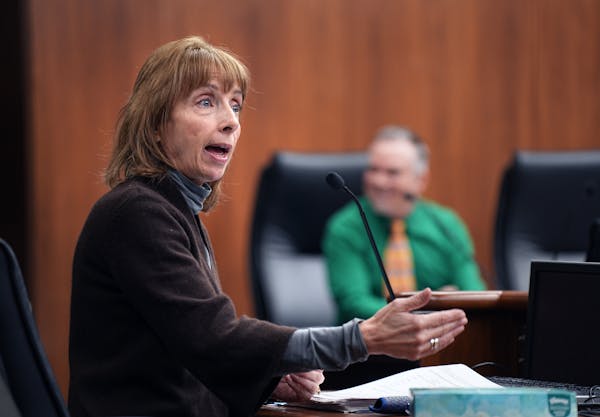Undergraduates at the University of Minnesota's Twin Cities campus could see a 3.5% tuition increase in 2023-24 — the second such hike in as many years.
Rochester students, too, face the prospect of a repeat 3.5 % increase, while tuition would go up 1 % in Crookston, Duluth and Morris, under the last annual budget plan assembled under President Joan Gabel, who leaves office Friday.
U officials say the increases are below the rate of inflation and needed to help balance revenue losses tied to enrollment declines, and for other purposes.
For state residents at the flagship Twin Cities campus, the hike would boost tuition by about $500 to $14,496, and come a year after in-state students were hit with their largest price hike in a decade.
Sara Davis, a student representative to the Board of Regents, said Thursday that while students appreciate efforts to keep tuition increases below inflation, a 3.5% increase still is a "high burden," especially with rising room-and-board rates, too.
The fiscal year 2024 budget presented Thursday totals $4.5 billion, a 3.8% increase over the current year, and includes $55.5 million in new state money. The U came up short, however, in efforts to persuade legislators and Gov. Tim Walz to provide $37.5 million to help freeze tuition and cover shortfalls stemming from enrollment losses.
In addition to addressing inflation and other fiscal pressures, the U is making the recruitment and retention of talented faculty and staff members its other top priority, said Myron Frans, senior vice president for finance and operations.
Merit-based salary increases of 3.75% are proposed and would take up the bulk of a roughly $116.5 million increase in such compensation costs. That is to be covered in part by tuition revenue and cuts averaging 1.5% across all academic units.
Pressure to reduce instructional costs prompted shows of support Thursday for programs like gender and ethnic studies, and American Indian studies.
Ruth Shaw, a professor in the Department of Ecology, Evolution and Behavior, also offered a broader defense of the College of Liberal Arts, reminding regents it was "the academic home of by far the most undergraduates at this university."
The Board of Regents is accepting written comments on the proposal via the board's website until noon on June 20. The board is expected to vote on the budget June 26.
Rising tuition and fees
In addition to the $490 tuition increase for in-state students, tuition for nonresident students at the Twin Cities campus would rise by $1,164 to $34,410.
Tuition will go up $448 for all undergraduates enrolled in Rochester, while increases in Duluth, Morris and Crookston would range from $116 to $128.
Room-and-board costs for students who live on campus also are set to climb, ranging from 0.8% in Rochester to 7.4% in the Twin Cities. The increases add up to $884 in the Twin Cities, $585 in Crookston, $552 in Morris, $456 in Duluth and $108 in Rochester.
Julie Tonneson, the university's budget director, said boosts in federal and state financial aid should cover one-third to one-half of the total increases in tuition, fees and room-and-board costs for eligible students living on campus. And that includes an unlimited meal plan, she emphasized.
In Rochester, the student services fee would more than double, from $336 to $754, and will cover access to expanded recreational opportunities, mental health services and intercultural initiatives — all backed by a campus committee, Tonneson said.
At a public forum Thursday, Robert McMaster, vice provost and dean of undergraduate education at the U, said he supports the tuition increase while Lisa Lewis, president and CEO of the University of Minnesota Alumni Association, offered a slightly cautionary take.
Over the past 10 years, McMaster said, the average annual tuition increase was 1.6%, with no hike during three of those years. He added that the average student debt on the Twin Cities campus also has dropped more than $1,000 to $27,000, leaving students with the fifth-lowest debt load in the Big Ten.
Meanwhile, students are helping to finance modern labs, employee salaries, tutoring and counseling: "These investments and student services have paid off very well and will continue to do so," McMaster said.
Lewis said alumni were alert to the affordability of higher education. Borrowing is a concern, she said, especially for young alumni looking to build careers, buy homes or start a family.
"They want to be financially secure," she said.

Baseball Metro Player of the Year packs up his five tools and leaves

Prep baseball 2024: 35 Minnesota stars who the recruiters covet
Police searching for St. Paul home intruder who raped, robbed woman

Friend heard money, relationship woes from man tied to Chanhassen killing who took his own life

